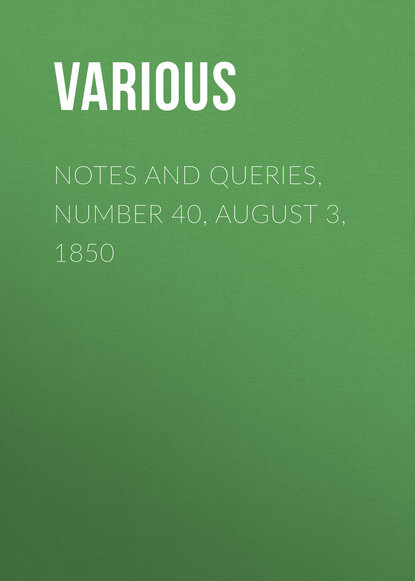По всем вопросам обращайтесь на: info@litportal.ru
(©) 2003-2024.
✖
Notes and Queries, Number 40, August 3, 1850
Автор
Год написания книги
2018
Настройки чтения
Размер шрифта
Высота строк
Поля
Drummond, p. 128.
On l. 373. (G.):—
"Virtue gives herself light thro' darkness for to wade."
Spenser's F. Queene.
(D.) For what is here finely said, and again beautifully expressed (v. 381.), we may perhaps refer to Ariosto's description of the gems which form the walls of the castle of Logistilla, or Reason:—
"Che chi l'ha, ovunque sia, sempre che vuole,
Febo (mal grado tuo) si può far giorno."
Orl. Fur. x. 60.
On l. 404. (G.):—
"Whiles a puft and rechlesse libertine,
Himselfe the primrose path of dalliance treads,
And reakes not his owne reed."
Hamlet> i. 3.
On l. 405. (G.):—
"Where death and danger dog the heels of worth."
All's Well that ends Well, iii. 4.
On l. 421. (M.):—
"Thrice is he armed that hath his quarrel just:
And he but naked, though locked up in steel,
Whose conscience with injustice is corrupted."
2 Henry IV., iii. 2.
On l. 424. (G.):—
"And now he treads th' infamous woods and downs."
Ph. Fletcher's Eclog., i. p. 4. ed. 1633.
On l. 494. (G.) The same sort of compliment occurs in Wither's Sheperd's Hunting. (See Gentleman's Mag. for December 1800, p. 1151.)
"Thou wert wont to charm thy flocks;
And among the massy rocks
Hast so cheered me with thy song,
That I have forgot my wrong."
He adds:—
"Hath some churle done thee a spight?
Dost thou miss a lamb to-night?"
Juvenilia, p. 417. ed. 12mo. 1633.
On l. 535. (M.):—
"Not powerful Circe with her Hecate rites."
Ph. Fletcher's Poetical Miscellanies, p. 65. ed. 1633.
On l. 544. (D.):—
"The soft sweet moss shall be thy bed
With crawling woodbine overspread."
Herrick's Hesperides, p. 223.
On l. 554 (G.):—
"And flattery to his sinne close curtain draws."
Ph. Fletcher's Purple Island, p. 112. ed. 1633.
On l. 635. (G.):—
"His clouted shoon were nailed for fear of wasting."
Ph. Fletcher's Purple Island, p. 113.
On l. 707. (G.) A passage in the Spanish Tragedy confirms Mr. Warton's reasoning—
"After them doth Hymen hie as fast,
Clothed in sable and a saffron robe."
Old Plays, vol. iii. p. 214. ed. 1780.
On l. 734. (G.):—
"Saw you not a lady come this way on a sable horse
studded with stars of white?"
Beaumont and Fletcher's Philaster, Act iv.
On l. 752. (G.):—
"A sweet vermilian tincture stained
The bride's fair cheek."
On l. 373. (G.):—
"Virtue gives herself light thro' darkness for to wade."
Spenser's F. Queene.
(D.) For what is here finely said, and again beautifully expressed (v. 381.), we may perhaps refer to Ariosto's description of the gems which form the walls of the castle of Logistilla, or Reason:—
"Che chi l'ha, ovunque sia, sempre che vuole,
Febo (mal grado tuo) si può far giorno."
Orl. Fur. x. 60.
On l. 404. (G.):—
"Whiles a puft and rechlesse libertine,
Himselfe the primrose path of dalliance treads,
And reakes not his owne reed."
Hamlet> i. 3.
On l. 405. (G.):—
"Where death and danger dog the heels of worth."
All's Well that ends Well, iii. 4.
On l. 421. (M.):—
"Thrice is he armed that hath his quarrel just:
And he but naked, though locked up in steel,
Whose conscience with injustice is corrupted."
2 Henry IV., iii. 2.
On l. 424. (G.):—
"And now he treads th' infamous woods and downs."
Ph. Fletcher's Eclog., i. p. 4. ed. 1633.
On l. 494. (G.) The same sort of compliment occurs in Wither's Sheperd's Hunting. (See Gentleman's Mag. for December 1800, p. 1151.)
"Thou wert wont to charm thy flocks;
And among the massy rocks
Hast so cheered me with thy song,
That I have forgot my wrong."
He adds:—
"Hath some churle done thee a spight?
Dost thou miss a lamb to-night?"
Juvenilia, p. 417. ed. 12mo. 1633.
On l. 535. (M.):—
"Not powerful Circe with her Hecate rites."
Ph. Fletcher's Poetical Miscellanies, p. 65. ed. 1633.
On l. 544. (D.):—
"The soft sweet moss shall be thy bed
With crawling woodbine overspread."
Herrick's Hesperides, p. 223.
On l. 554 (G.):—
"And flattery to his sinne close curtain draws."
Ph. Fletcher's Purple Island, p. 112. ed. 1633.
On l. 635. (G.):—
"His clouted shoon were nailed for fear of wasting."
Ph. Fletcher's Purple Island, p. 113.
On l. 707. (G.) A passage in the Spanish Tragedy confirms Mr. Warton's reasoning—
"After them doth Hymen hie as fast,
Clothed in sable and a saffron robe."
Old Plays, vol. iii. p. 214. ed. 1780.
On l. 734. (G.):—
"Saw you not a lady come this way on a sable horse
studded with stars of white?"
Beaumont and Fletcher's Philaster, Act iv.
On l. 752. (G.):—
"A sweet vermilian tincture stained
The bride's fair cheek."











